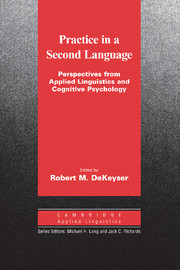Book contents
- Frontmatter
- Contents
- List of contributors
- Series editors' preface
- Introduction: Situating the concept of practice
- I: FOUNDATIONS
- Chapter 1 Input in the L2 classroom: An attentional perspective on receptive practice
- Chapter 2 Output practice in the L2 classroom
- Chapter 3 Interaction as practice
- Chapter 4 Feedback in L2 learning: Responding to errors during practice
- II: INSTITUTIONAL CONTEXTS
- III: INDIVIDUAL DIFFERENCES
- Conclusion: The future of practice
- Glossary
- Index
- References
Chapter 4 - Feedback in L2 learning: Responding to errors during practice
Published online by Cambridge University Press: 27 January 2010
- Frontmatter
- Contents
- List of contributors
- Series editors' preface
- Introduction: Situating the concept of practice
- I: FOUNDATIONS
- Chapter 1 Input in the L2 classroom: An attentional perspective on receptive practice
- Chapter 2 Output practice in the L2 classroom
- Chapter 3 Interaction as practice
- Chapter 4 Feedback in L2 learning: Responding to errors during practice
- II: INSTITUTIONAL CONTEXTS
- III: INDIVIDUAL DIFFERENCES
- Conclusion: The future of practice
- Glossary
- Index
- References
Summary
Introduction
It is fitting that a volume on practice in second language learning should include a chapter on feedback, as the notion that practice can promote L2 development seems to imply that learners do not yet produce error-free output. Thus, a comprehensive understanding of practice must involve consideration of the ways in which interlocutors respond to learner error, and the implementation of a practice-based pedagogy requires instructors to make decisions about whether to provide feedback, and if so, what type(s) to provide. Indeed, the issue of feedback is intricately linked to other practice-related constructs such as the effects of input, output, and interaction, and thus it has been briefly touched upon in previous chapters. The present chapter, while mentioning these constructs, aims to give readers a fuller appreciation of feedback per se, as well as its role in L2 practice. Because most L2 feedback research has not been conducted within a practice framework, a thorough understanding of feedback and of the empirical research in this area requires a consideration of the different perspectives from which such research has been carried out. Therefore, after defining the relevant terminology, this chapter will examine the role of feedback within different theoretical perspectives on SLA. This will lead to a fine-grained analysis of the characteristics of feedback and will facilitate the interpretation of empirical feedback studies reviewed in a subsequent section. The chapter will conclude with a discussion of the implications of such research for SLA theory and L2 pedagogy.
Information
- Type
- Chapter
- Information
- Practice in a Second LanguagePerspectives from Applied Linguistics and Cognitive Psychology, pp. 111 - 138Publisher: Cambridge University PressPrint publication year: 2007
References
Accessibility standard: Unknown
- 29
- Cited by
